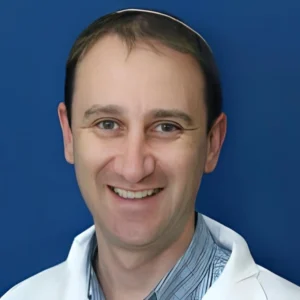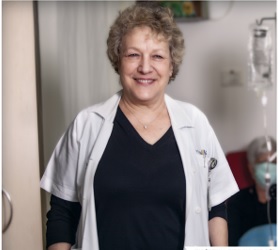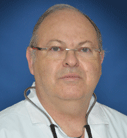Healthcare with Confidence
Immunotherapy and targeted therapy have transformed the treatment of lung cancer, giving many patients new hope for long-term survival.
Unlike traditional chemotherapy, which attacks all rapidly dividing cells, immunotherapy focuses on stimulating the patient’s immune system while targeted therapy focuses on blocking specific genetic mutations that drive tumor growth.
In Israel, patients benefit from world-class oncologists, advanced genomic testing, and access to the latest FDA- and EMA-approved medications, as well as clinical trials.
Thanks to these innovations, 20–25% of patients with lung cancer are now long-term survivors.
What Is Immunotherapy for Lung Cancer?
Immunotherapy uses drugs that “train” the immune system to recognize and attack cancer cells. Many lung cancer tumors develop ways to hide from the immune system by exploiting immune checkpoints such as PD-1, PD-L1, and CTLA-4. Immunotherapy drugs block these pathways, allowing immune cells to destroy the cancer.
Checkpoint Inhibitors Used in Israel
- Nivolumab (Opdivo®) – blocks PD-1 receptor; approved for NSCLC since 2015.
- Pembolizumab (Keytruda®) – blocks PD-1; approved for tumors with PD-L1 expression, MSI-H, or dMMR across multiple cancers.
- Atezolizumab (Tecentriq®) – blocks PD-L1; effective for metastatic NSCLC and other cancers.
- Durvalumab (Imfinzi®) – used as consolidation therapy after chemoradiation in stage III NSCLC.
- Ipilimumab (Yervoy®) – blocks CTLA-4; often combined with Opdivo.
How It Works
Cancer cells express PD-L1 proteins, which bind to PD-1 receptors on immune cells, turning them off.
Immunotherapy drugs block this binding, keeping immune cells active and able to kill tumors.
Combination strategies (PD-1 + CTLA-4 inhibitors, or immunotherapy + chemotherapy) have shown greater effectiveness in advanced cases.
TIL Therapy (Tumor-Infiltrating Lymphocytes)
Israel is also exploring TIL therapy, where a patient’s T-cells are removed, reengineered in the lab to recognize cancer, and reinfused. Early trials show promising results for advanced NSCLC after other treatments have failed.
Lung Cancer Doctors – Consultation Online
What Is Targeted Therapy for Lung Cancer?
Targeted therapy works by blocking specific genetic mutations that fuel cancer growth. Unlike chemotherapy, these drugs attack only cancer cells with the mutation, reducing side effects and improving outcomes.
Key Targeted Drugs Available in Israel
EGFR Mutations (common in non-smokers, women, Asian patients)
- Osimertinib (Tagrisso®) – standard first-line drug for EGFR mutations.
- Erlotinib (Tarceva®)
- Gefitinib (Iressa®)
- Afatinib (Giotrif®)
ALK-Positive NSCLC
- Alectinib (Alecensa®)
- Crizotinib (Xalkori®)
- Brigatinib (Alunbrig®)
- Ceritinib (Zykadia®)
- Lorlatinib (Lorviqua®)
ROS1 Rearrangements
- Entrectinib (Rozlytrek®)
- Crizotinib (Xalkori®)
- Lorlatinib (Lorviqua®)
BRAF Mutations
- Dabrafenib (Tafinlar®) + Trametinib (Mekinist®) (combined therapy).
- MET Exon 14 Skipping Mutations
- Capmatinib (Tabrecta®)
- Tepotinib (Tepmetko®)
RET Mutations
- Pralsetinib (Gavreto®)
- Selpercatinib (Retevmo®)
NTRK Gene Fusions
- Larotrectinib (Vitrakvi®)
- Entrectinib (Rozlytrek®)
HER2 and KRAS Mutations
- Trastuzumab Deruxtecan (Enhertu®) – HER2-targeted therapy.
- Sotorasib (Lumakras®) and Adagrasib (Krazati®) – for KRAS G12C mutations, increasingly used in Israel nowdays.
Anti-Angiogenic Therapy (Blocking Tumor Blood Supply)
- Bevacizumab (Avastin®)
- Ramucirumab (Cyramza®)
- Necitumumab (Portrazza®)
Who Is a Candidate for Immunotherapy or Targeted Therapy?
- NSCLC patients (80–85% of lung cancers) are the main candidates.
- Patients undergo biopsy and molecular genomic testing to identify mutations or PD-L1 expression.
- Smokers, non-smokers, men, and women can all benefit depending on the tumor’s biology.
How Are These Treatments Given?
- Immunotherapy drugs are usually given intravenously every 2–3 weeks.
- Targeted therapy drugs are often taken as oral tablets at home.
Treatment duration varies and is personalized based on response and tolerance.
What’s New in Israel
- Liquid biopsy (blood-based genetic testing): Now widely used to track mutations without repeated surgery.
- Combination therapies: More patients receive immunotherapy + targeted therapy, showing improved survival in advanced NSCLC.
- Expanding indications: Drugs like Keytruda and Tagrisso are approved for earlier stages, preventing recurrence after surgery.
- Personalized treatment plans: Every patient’s case is reviewed by a multidisciplinary tumor board (oncologists, thoracic surgeons, radiologists, pathologists).
Why Choose Israel for Lung Cancer Treatment?
- World-renowned oncologists – many featured in Forbes “Best Doctors” list.
- Cutting-edge genomic testing to match the right therapy to the right patient.
- Access to new drugs and clinical trials not available in many countries.
- Personalized approach – each treatment plan is tailored to your genetics and health profile.
- Options for online consultations before traveling.
Immunotherapy and targeted therapy in Israel are reshaping the future of lung cancer care. With advanced diagnostics, personalized medicine, and access to the newest drugs, Israeli oncology centers help patients live longer, with better quality of life and renewed hope.
Frequently Asked Questions
- What is the difference between immunotherapy and targeted therapy?
Immunotherapy boosts your immune system to fight cancer, while targeted therapy blocks specific genetic mutations inside cancer cells. - How do I know if I am eligible?
A biopsy and molecular tests will show if your tumor has the necessary mutations or PD-L1 expression. - Can these treatments replace chemotherapy?
In many cases, yes. Sometimes they are combined with chemotherapy for stronger results. - Are these treatments available in Israel now?
Yes. All major FDA- and EMA-approved immunotherapy and targeted therapy drugs are available in Israel.
With personalized medicine, Israeli oncologists now offer lung cancer patients access to some of the most advanced treatments in the world – giving every patient the chance for a longer and healthier life.






